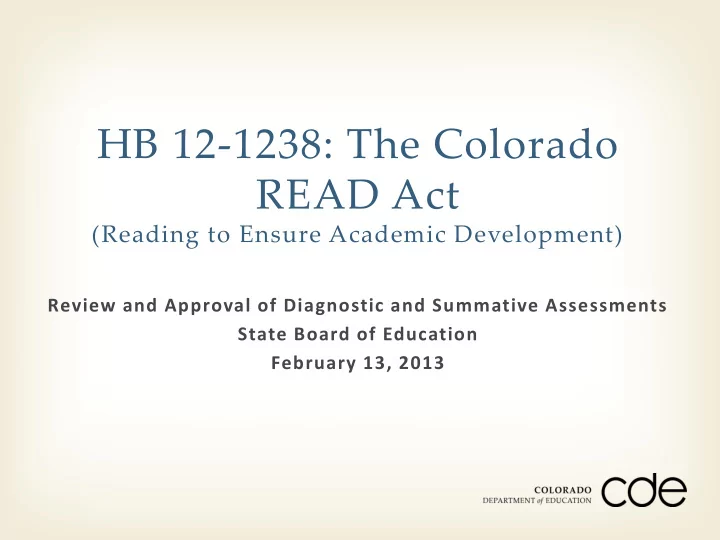

HB 12-1238: The Colorado READ Act (Reading to Ensure Academic Development) Review and Approval of Diagnostic and Summative Assessments State Board of Education February 13, 2013
Statutory Requirements Related to Assessments Section 22-7-1209 (2) (a) (I) – The department shall review and recommend to the state board reading assessments, including interim, summative, and diagnostic assessments, for kindergarten, and first, second, and third grades. 2
State-wide K-3 Assessments School Finance Act Interim Diagnostic Summative HB 12-1345 Assessments Assessments Assessments RFP contract awarded 2013-2014 school year Required for students Optional for grades K-2 to Wireless Generation with a Significant Reading Deficiency DIBELS Next DIBELS, DRA2, and Assessment from the If used, must select PALS approved list from approved list Interested districts can May change for 2014- May be used to apply to receive 2015 school year progress monitor in software at no charge addition to the interim assessment Forthcoming Request Will also be used to Basis of the READ plan for Application (RFA) progress monitor and instructional intervention 3
Interim Assessments Required for all K-3 students (screening to determine level of risk, progress monitoring to track progress, and end of year outcome assessment) Presented to the State Board in November 2012 a proposal to keep the same three currently approved assessments (approved through the Colorado Basic Literacy Act) Dynamic Indicators of Basic Early Literacy Skills (DIBELS) Phonological Awareness Literacy Screening (PALS) Developmental Reading Assessment 2 nd edition (DRA2) Recommend keeping these assessments through the 2013-2014 school year Request for Information (RFI) process in the fall of 2013 to make possible revisions to the list 4
Diagnostic Assessments Required for all K-3 students who may have a Significant Reading Deficiency based on initial screening with the interim assessment Request for Information (RFI) and committee review Received 18 submissions- 9 met the criteria for recommendation to the state board Established criteria: Assesses one, or multiple, underlying skills related to the 5 components of reading Technically adequate by being valid, reliable, and free of bias User friendly so that all teachers can administer and interpret Demonstrate feasibility including time to assess and cost Measure academic skills and abilities under the practitioner’s control Quantitative in nature 5
Diagnostic Assessments Recommended list for state board approval Curriculum Associates i-Ready Pearson AIMSweb PALS Marketplace Phonological Awareness Literacy Screening (PALS) Renaissance STAR Early Literacy Assessment Northwest Evaluation Association (NWEA) Children’s Progress Academic Assessment (CPAA) Pearson Peabody Picture Vocabulary Test Pearson Woodcock Reading Mastery Test, 3 rd edition (WRMT-III) Cambium Education, Inc. d/b/a Sopris Learning DIBELS Deep Wireless Generation Burst Reading Assessments 6
Summative Assessments Optional for K-2 students Request for Information (RFI) and committee review Received 8 submissions- 2 met the criteria for recommendation to the state board Established criteria: Measure the conceptual knowledge of reading (vocabulary, language structures, reasoning, and literacy knowledge) as well as the procedural skills (phonological awareness, decoding, and word recognition) Technically adequate by being valid, reliable, and free of bias User friendly so that all teachers can administer and interpret Demonstrate feasibility including time to assess and cost Measure how well a student is mastering the academic standards, including the foundational skills 7
Summative Assessments Recommended list for board approval Curriculum Associates i-Ready Northwest Evaluation Association (NWEA) MAP for Primary Grades (MPG) 8
Next Steps Department will post recommendations to the website for feedback before March board meeting Notify publishers Publishers may appeal to the Department no later than 14 days after notification State Board vote for approval in March Department will periodically review lists and recommend updates to the State Board as appropriate 9
Recommend
More recommend